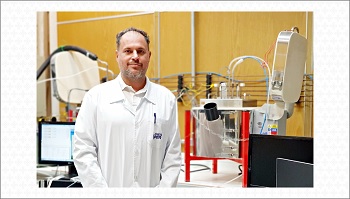CINE members participate in fuel cell research for Nissan’s ethanol electric car

Senior technologist Fabio Coral Fonseca, coordinator of CINE’s Methane to Products Program, leads the technical team that is participating in the development of Nissan’s ethanol-powered electric car at IPEN. Lab technician Francisco Tabuti, a member of CINE, participates in the team. The work is taking place in the context of two partnership agreements signed between the Japanese automaker and the Brazilian research institute: the first one in 2019 and the most recent, on June 15 this year.
The vehicle in question is based on the use of a solid oxide fuel cell (SOFC). In this device, the electrical energy that makes the engine work is generated from bioethanol, a biofuel that Brazil widely produces and sells throughout the country.
SOFCs are the most efficient devices for directly converting the chemical energy of a fuel into electrical energy. The process is carried out as follows. In the SOFC catalyst layer, ethanol molecules are split, forming hydrogen and carbon-based compounds. This phase is called “ethanol reform”. Then, in the electrochemical layer of the fuel cell, hydrogen is oxidized, generating electricity.
Conversion of energy in these SOFCs is a clean process. In ethanol reform, some carbon dioxide is emitted, but this emission is neutralized during the growth of the plants used to produce the fuel (in Brazil, typically, sugar cane).
A pioneer in the country in the development of SOFC, with studies started in 2000, IPEN aimed to use ethanol in these devices since the beginning, considering the wide availability of this fuel in the country. In 2003, Fabio Fonseca, who had been working with related issues since his undergraduate scientific initiation, was hired by IPEN to lead research in SOFC.
Between 2016 and 2017, Nissan carried out the first tests in Brazil with a real prototype of an ethanol-powered electric car, which circulated on the country’s roads. In 2019, the automaker signed an agreement with IPEN to improve SOFCs. The work involved the participation of Fabio Fonseca, his team at IPEN and national and international collaborators.
“In the first stage, we managed to advance in an important point, which is to reduce the operating temperature of solid oxide fuel cells operating with ethanol to temperatures below the usual ones, which are close to 800 °C”, says Fonseca, who, at CINE, works with fuel cells to convert methane into molecules with greater added value.
The agreement signed on June 15 renews the partnership between the Nissan and IPEN teams. “In this new stage, we are going to continue these advances, improving the stability of the system at low temperatures in order to contribute to the optimization of the device”, says Fonseca.
More information about the IPEN-Nissan agreement: https://www.ipen.br/portal_por/portal/interna.php?secao_id=38&campo=15932
Contact

Fabio Fonseca
USP, Brasil











